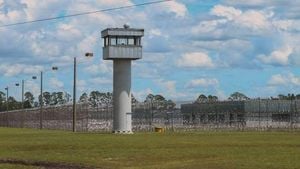When the Office of Management and Budget issued a sweeping order this week freezing trillions of dollars in federal grants and loans, it stirred up confusion and debate within the governmental corridors of power. Senior White House officials had reportedly not been privy to the memo prior to its issuance, which quickly prompted legal challenges and intense backlash affecting programs like Medicaid.
According to sources familiar with the inner workings of the administration, the order was met with surprise among top aides who were frustrated they had not received any review before its release. With the fallout from the freezing directive extending beyond mere bureaucratic mishap, finger-pointing has commenced within the administration, coalescing around Mark Paoletta, the OMB’s general counsel. Discussions have circulated about potentially reassessing Paoletta’s position amid the disarray.
The original OMB directive aimed to halt federal aid and grant spending as officials sought to align these programs with various executive orders from President Donald Trump. Notably, the OMB scrapped the directive just 48 hours after issuing it, signaling the administration's acknowledgment of the backlash.
Compounding matters, District Judge John McConnell Jr. of the U.S. District Court for the District of Rhode Island intervened, indicating he would impose a temporary restraining order barring the freeze. McConnell’s ruling came on the heels of another judge's decision earlier this week, cementing the legal opposition to what appeared to be sweeping defunding efforts. The decision concluded with McConnell stating, "The Executive cites no legal authority allowing it to do so; no federal law would authorize the Executive’s unilateral action here.”
McConnell issued comments reinforcing this point, particularly taking issue with statements made by White House press secretary Karoline Leavitt on social media. Leavitt claimed the memo was being rescinded, reassuring the public, “This is NOT a rescission of the federal funding freeze.” Instead, she maintained, it was merely the OMB memo being rescinded to alleviate any confusion stemming from court injunctions. The judge, peering through the political jargon, saw the potential for continued implementation of the freeze, as indicated by Leavitt’s post.
By saying, "That’s my read of the tweet. I can’t believe I’m saying this, but that's my read of the tweet,” McConnell highlighted his belief there remained intent within the executive wing to carry out the original policy, raising alarms about the administration's subsequent intentions.
Legal experts and officials have pointed to the unprecedented nature of the OMB's freezing directive and the potential disruption it posed to state operations. This freeze was located within the larger backdrop of Trump’s aggressive approach to reshaping federal programs and fighting against what he regarded as bureaucratic overreach.
The directive and subsequent rescission has led to conversations among state officials about not only potential losses of federal funds but also broader consequences for social services on which many residents rely. A coalition of 22 states initiated legal challenges against the OMB directive, arguing against the legality of the freeze.
Judge McConnell’s rulings fall within the burgeoning struggle between state governments and the federal administration. The back and forth between freezing and later rescinding the directive emphasizes the growing tensions and uncertainties within Washington, D.C. At the heart of the discord lies the principle of state rights versus federal power, as many officials express concerns over the health and welfare of citizens dependent upon federal assistance.
Judicial reactions to the Trump administration's moves have underscored the balancing act between executive authority and constitutional boundaries. Beyond the legal framework, frustrations are mounting over administrative mismanagement—what should have been clear lines of communication about funding have devolved instead to confusion and potential crises for state welfare programs.
The situation also raises fundamental questions about the future of federal aid and funding policies, particularly as the government grapples with both its responsibilities and constitutional limitations. Do these challenges pose risks to the central tenets of administrative governance? For now, the White House appears to be on the defensive, as it seeks to clarify its position and intentions moving forward.
While the OMB continues to navigate turbulent waters, states are gearing up for their fights against what they perceive as encroachments on their financial resources. Future court deliberations and the administration's subsequent actions will likely reflect the prevailing tension between upholding federal powers and adhering to constitutional mandates.



